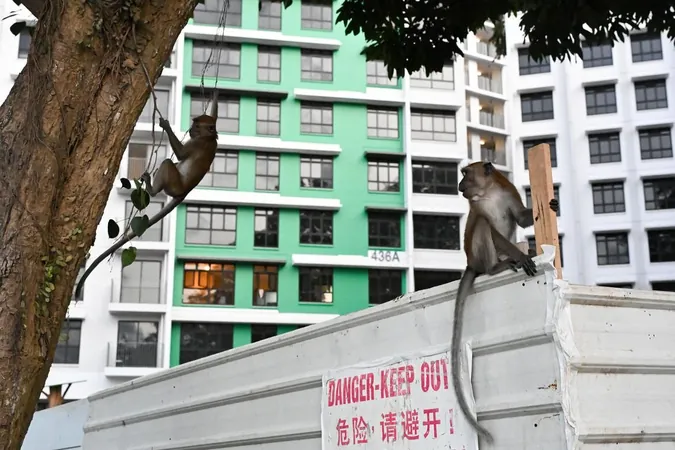
Monkey Mayhem in Punggol: Authorities Take Action as 200 Sightings Reported!
2025-05-19
Author: Arjun
Punggol's Primate Predicament
SINGAPORE – Wild monkeys have been wreaking havoc in Punggol, leading to a flurry of reports from residents. With approximately 200 sightings and alarming incidents involving these long-tailed macaques intruding into homes, local authorities have initiated drastic measures.
Culling and Sterilization for Safety
To address the escalating situation, the National Parks Board (NParks) has trapped and sterilized about 50 macaques in the area, releasing many back to Coney Island Park as part of a long-term strategy. However, aggressive individuals deemed a threat to public safety faced a different fate: humane euthanasia.
"These monkeys frequently returned to urban areas in search of food, making them unsuitable for relocation," explained How Choon Beng, NParks' director of wildlife management.
A Community Under Siege
Northern Punggol, home to new residential developments and the Singapore Institute of Technology, has seen the macaque population surge as these creatures venture from forested areas to human habitats in search of food. The frequency of monkey sightings has alarmed local residents, prompting a response from both NParks and community leaders.
Educating Residents Amidst Monkey Intrusions
In response to the monkey menace, outreach programs led by animal welfare groups like Acres and the Jane Goodall Institute have commenced, educating residents on how to coexist with their furry neighbors. Residents are advised to avoid feeding the monkeys or leaving food exposed, as illegal feeding exacerbates the issue.
Calls for Change and Community Action
As reports of intrusions rise, some residents have shared their shock after discovering monkeys rummaging through their kitchens. One resident described feeling violated after a monkey turned his kitchen upside down during a brief absence.
Other locals recognize the broader issue at play, understanding that urban expansion has effectively displaced these animals, leaving them no choice but to forage in human spaces. 'We took their homes; now they're looking for food,' one resident reflected.
A Multi-faceted Approach to Wildlife Management
To prevent future incidents, NParks continues to collaborate with local councils, promoting wildlife management practices alongside ecological restoration. This includes planting native fruit trees in Coney Island Park to provide alternative food sources for the macaques.
An Ongoing Challenge
Experts like Andie Ang of Mandai Nature raise critical questions about defining aggressive behavior among macaques. With urban areas expanding, the need for community empathy and understanding of wildlife behaviors is more crucial than ever.
The situation in Punggol underscores an urgent need for a change in perspective; as both human and wildlife populations navigate this shared space, fostering harmony is essential.
Final Thoughts
As Punggol residents adapt to their new primate neighbors, one thing remains clear: education, community engagement, and wildlife conservation are vital for a peaceful coexistence with these captivating creatures.

 Brasil (PT)
Brasil (PT)
 Canada (EN)
Canada (EN)
 Chile (ES)
Chile (ES)
 Česko (CS)
Česko (CS)
 대한민국 (KO)
대한민국 (KO)
 España (ES)
España (ES)
 France (FR)
France (FR)
 Hong Kong (EN)
Hong Kong (EN)
 Italia (IT)
Italia (IT)
 日本 (JA)
日本 (JA)
 Magyarország (HU)
Magyarország (HU)
 Norge (NO)
Norge (NO)
 Polska (PL)
Polska (PL)
 Schweiz (DE)
Schweiz (DE)
 Singapore (EN)
Singapore (EN)
 Sverige (SV)
Sverige (SV)
 Suomi (FI)
Suomi (FI)
 Türkiye (TR)
Türkiye (TR)
 الإمارات العربية المتحدة (AR)
الإمارات العربية المتحدة (AR)